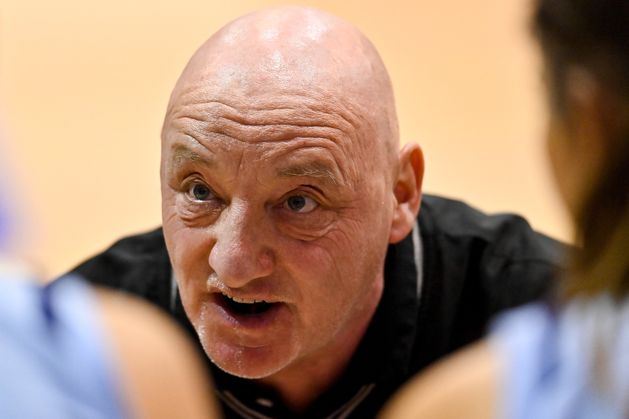Top coach says ‘there was very little reaction from Basketball Ireland’ as Dublin club folded in July after 35 years
In July, Mark Ingle made the tough decision to disband the club over financial challenges, calling it quits 35 years after he and his wife founded it.
The head coach – once recruited into Jim Gavin’s Dublin backroom – is better known in basketball for guiding his side to three cups and a league title in 2020.
So it caused a stir when he announced DCU Mercy would no longer compete, prompting many messages and tributes.
Although Basketball Ireland acknowledged the news on social media, Ingle was surprised by the official reaction.
“I got a load of private texts from players and most of the clubs in the league,” he said. “But there was very little reaction from Basketball Ireland, if I’m being honest. I would have expected more.
“I would have expected something from our own committee. I would have expected something from hierarchy. No association wants to lose one of their top clubs.”
Basketball Ireland would later express its “huge disappointment” to the Irish Independent about the loss of the club and made offers to keep the side in the second tier.
They would not be taken up as DCU Mercy’s club costs had become a bigger challenge in inflationary times.
Ingle estimates that it costs a women’s team approximately €35,000 to compete for a season while a men’s side could cost “between €50,000 to €60,000.”
A lot to invest when teams are playing for prize money of just €1,600 for winning the league last year – a figure that the governing body reviews annually.
The price for hosting the ten regular-season matches last term formed a considerable part of the challenge facing DCU Mercy.
“The referees fees are very expensive at almost €300 for a home game. Then you’ve got table officials,” Ingle said.
“You’ve got to film the game and you’ve to pay for an app. You’ve to pay for somebody to put the statistics onto the app. The whole thing was costing nearly €550 a home game.”
However Basketball Ireland provided a different figure for officiating, saying clubs paid €151.90 per game for two referees and a game commissioner last season.
They also added that paying the four table officials are at the discretion of the club. Teams often pay these volunteers and this may account for some of the difference in figures.
DCU Mercy celebrate winning the cup in 2018. Photo: Eóin Noonan/Sportsfile
The governing body also say there is no cost for clubs to use the streaming and statistics apps in a statement to the Irish Independent. Again, clubs may pay volunteers to operate them however.
“In 2022/’23 season the National Leagues moved from paper scoresheets to a digital scoresheet, captured through an app,” a Basketball Ireland statement read.
“There is no additional payment for clubs to use the scoresheet app, in addition tablets were supplied to each National League club by Basketball Ireland for use by club table officials as part of this digital rollout.”
“Basketball Ireland also launched a streaming service basketballireland.tv for the 2022/’23 season. BITV broadcasts all National League and National Cup games live, National League clubs receive a fee for filming games.”
Another issue was the cost of recruiting American players. Teams are limited to two on the court at the any one time, and they remain crucial to staying competitive.
A partnership with DCU helped the club with accommodation for these players in Dublin – essential when the average rent for house in the capital is €2,427, according to daft.ie.
Teams must also cough up for flights to and from the USA.
Then players must be registered before setting foot on court, which breakdowns as €250 for international clearance from FIBA, €92 for a playing licence for non-Europeans and €10 for insurance.
And that’s not all.
“Most of the players we got in DCU would not have been getting any money in American [as students] but now they’re getting $200 or $300 a week,” Ingle added.
“So they come over here now and they’re looking for expenses. It’s fairly hard to get a player without an agent so then you’ve the agent fees as well.”
However, the biggest price paid may be losing one of the most dominant clubs in the league, with Ingle bearing the brunt.
“It was a very tough decision because you’d the players to worry about and that,” he says. “It became too difficult to raise cash. You don’t realise until you’re in it, how much you have to raise.”

